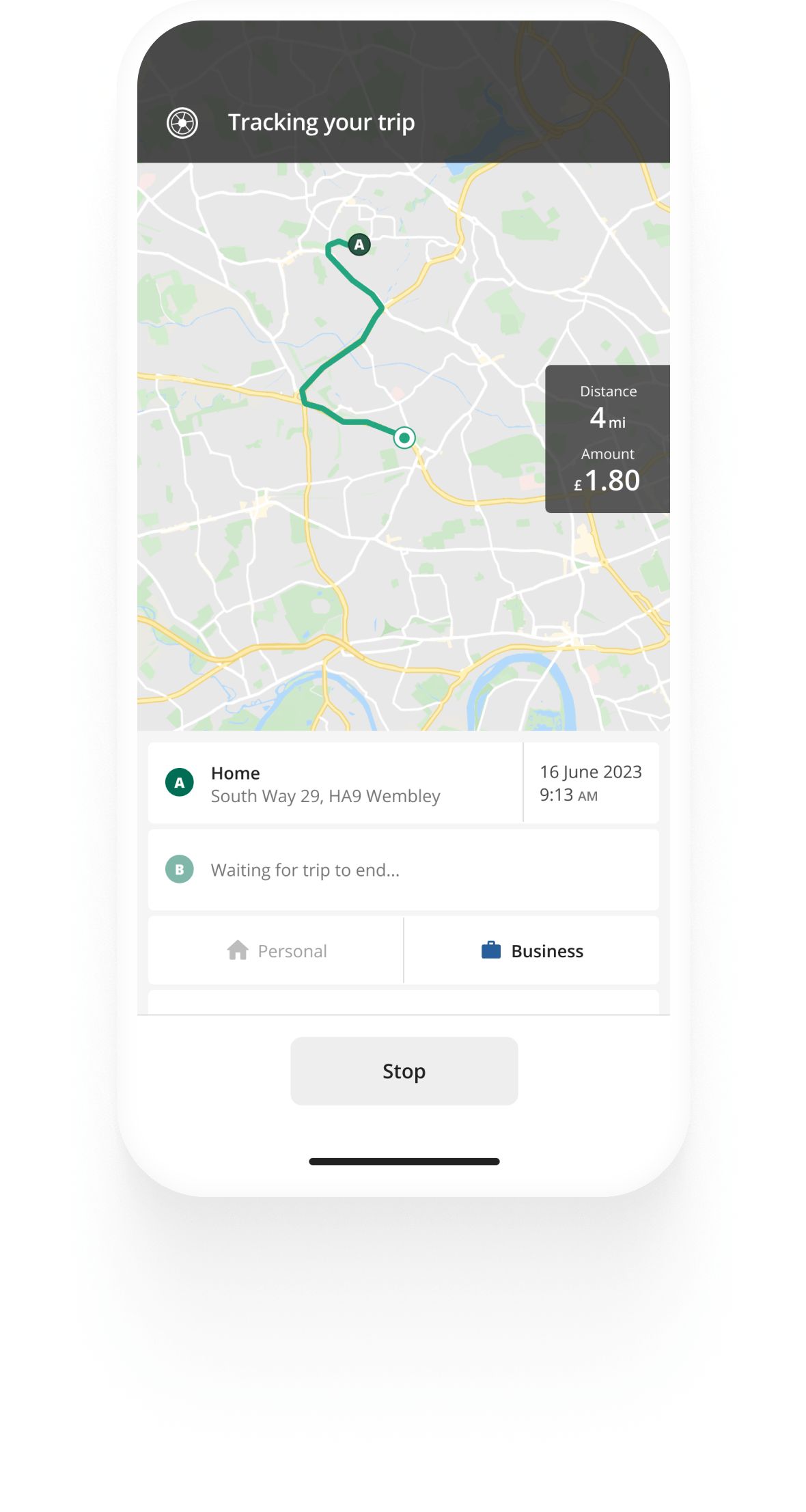Track mileage automatically
Get started
HMRC mileage log requirements
Keeping a mileage logbook is necessary to receive a mileage allowance or claim mileage allowance relief from HMRC. How you do this is up to you, but you must record certain information, regardless of the logbook format you choose.
Who should keep a mileage log
Mileage allowances are a great way to lower your expenses if you use your personal vehicle for business purposes. However, HMRC will not accept your word for it; to claim mileage from your employer or from HMRC, you must provide proof. In other words, a mileage logbook is required and should contain records of all the trips for which you claim reimbursement.
In your mileage log, you record how frequently and for how long you drive your vehicle for business and private purposes. This allows you to determine exactly how much you drove for business and be reimbursed accordingly.


Mileage tracking made easy
Trusted by millions of drivers
Automate your mileage log Automate your mileage log

Automatic mileage tracking and HMRC-compliant reporting.
Get started for free Get started for freeEligibility for MAP and MAR
How you keep a log may differ depending on your circumstances. Firstly, you need to determine whether you are claiming MAP (Mileage Allowance Payments) from your employer or MAR (Mileage Allowance Relief) from the tax authority. While HMRC has requirements your mileage log must meet to be considered compliant, an employer may require that you log additional information compared to the tax authority.
What to record in your mileage log book
A mileage logbook typically covers a period of one year if you are claiming mileage allowance relief at tax time. If you receive reimbursement from your employer, your mileage log should cover the period for which you receive reimbursement, e.g. monthly.
You should record the following information in your HMRC mileage log for each trip:
- the journey's date
- the purpose (business or personal)
- the start and destination addresses, including postcodes
- the total number of miles driven
- any additional information your employer might require, such as odometer readings
Keeping a mileage log can be time-consuming, so consider using a mileage tracker app to automate this process.
How much you can save by keeping a mileage log
The savings depend on how much you drive your car for business. You miss out on potential reimbursement whenever you forget to log a trip. The more diligently you use your mileage logbook and log every necessary detail, the more likely you are to receive proper reimbursement. The current official rate is 45p per mile, but employers can choose the rate they reimburse employees at.
Mileage log formats accepted by HMRC
HMRC accepts many logbook formats, including paper and electronic ones. If you have the time to enter everything manually, you can use an Excel mileage log template, a PDF, a Sheets file, or a physical logbook. For a faster solution, we recommend a mile tracker app as your online logbook. Apps can automatically track your trips and require less time to use.
Other important considerations for your mileage log
- You must document each journey, including the start and end address, the distance travelled, and the reason for the journey. Entries must be legible and clear.
- If you lose your mileage log, contact HMRC for guidance on what to do.
- Log the data in a timely, chronological, and orderly manner.
- Use exact figures - don't round up numbers such as your mileage and expected reimbursement.
- If you use a spreadsheet, keep a spare log and often back up the one you have to avoid losing your data.
- Keep your mileage logs for at least six years, as HMRC can request records for any tax return within this period.
For more information about mileage allowance and reimbursements check out our HMRC mileage guide.
FAQ

Tired of logging mileage by hand?
Effortless. HMRC-compliant. Liberating.
Top posts
- HMRC travel expenses guidelines
- HMRC advisory fuel rates 2025
- Automate mileage tracking in healthcare with Driversnote Teams UK
Related posts
Free mileage log book template
Latest update: 7 May 2025 - 2 min read
Whether you're an employee or a business owner, it's crucial to keep good mileage records in a mileage log book.
HMRC Mileage Guide
Latest update: 2 April 2025 - 5 min read
Welcome to our guide on mileage claims and reimbursement in the UK. This guide will walk you through the rules that apply to your situation.
HMRC travel expenses guidelines
Latest update: 16 January 2026 - 2 min read
This guide for employers, employees, and sole-traders offers an overview of what you need to know if you're seeking tax relief or reimbursement for travel expenses.
.svg)

